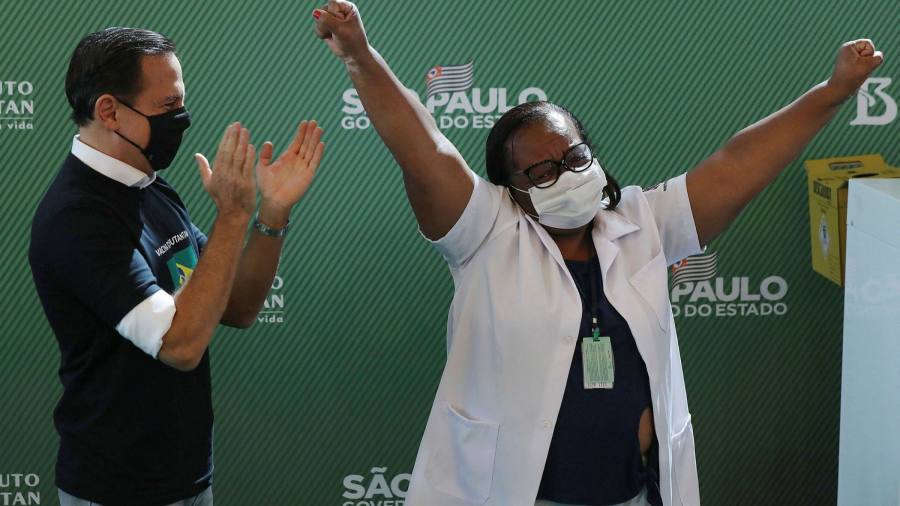Brazil’s health regulator has given the green light to the Oxford/AstraZeneca and Chinese-made Sinovac coronavirus vaccines, paving the way for Latin America’s largest nation to begin an immunisation programme that has been marred by delays and political bickering.
Following a marathon five-hour presentation broadcast live on Sunday, the board of watchdog Anvisa (the Agência Nacional de Vigilância Sanitária) voted unanimously to grant emergency use approval to both vaccines in a country which has the second-highest Covid-19 death toll, at almost 210,000.
“There is only one enemy. Our best chance in this war has to be by changes to social behaviour. Without this, even with a vaccine, victory will not be achieved,” Antônio Barra Torres, head of the agency, said during the event.
Shortly after the decision, a 54-year-old nurse from São Paulo became the first to receive an injection, as health minister Eduardo Pazuello said the country could reach up to 1m people vaccinated a day.
The authorisation follows controversy about the effectiveness of the Sinovac jab, named CoronaVac, which was jointly developed by the Beijing-headquartered company and the Butantan Institute in São Paulo.
After initially disclosing that the jab showed an efficacy of 78 per cent during trials in Brazil, scientists from the biomedical institute earlier this week clarified that the “generalised efficacy rate,” which includes cases with very light symptoms, was just about 50 per cent — barely above the threshold for a vaccine to be considered viable.
210m
Brazil’s population. The government has ordered 254m doses of the Oxford/AstraZeneca vaccine and 100m of CoronaVac
The new data on CoronaVac further fuelled scepticism about the Chinese-made vaccine, which has long been the target of attacks from rightwing President Jair Bolsonaro and his supporters. Some 22 per cent of Brazilians say they would not take a vaccine, in line with Mr Bolsonaro’s own stance, even as infections and mortalities rise.
The emergency approval from Anvisa, legally effective once published in the official government gazette, opens the door for Brazilian health authorities to begin administering injections as soon as this week. It covers 6m doses of CoronaVac imported from China and a batch of 2m Oxford/AstraZeneca jabs yet to be shipped from India, which has just started its own immunisation programme.
To inoculate its population of 210m, Brazil has ordered 254m doses of the Oxford/AstraZeneca vaccine and 100m of CoronaVac, respectively, most of which will be produced domestically.
However, it is lagging behind not only developed nations but also others in the region, including Argentina and Mexico, which began immunisation programmes last month.
Ministers have said priority will be given to Manaus, the riverside capital of Amazonas state. The health system there has been overwhelmed by hospital admissions and deaths have resulted from a shortage of oxygen supplies.
Concerns have also emerged about the availability of supplies needed to administer the vaccines, particularly syringes.
Critics say the situation is a result of mismanagement by the ministry of health, which Mr Bolsonaro has stacked with military officers often in place of health professionals. Mr Pazuello, the minister, is an active duty general, but with a background in logistics.
“Except for some areas where there are still qualified people, most management roles are occupied by people who do not have the necessary qualifications, and they are unable to implement the machinery to develop already established programmes, such as the country’s immunisation programme,” said Fernando Aith, a professor of public health at the University of São Paulo.
Despite the delays, however, Mr Pazuello has predicted Brazil will “very soon” be exporting vaccines given the country’s pharmaceutical manufacturing capabilities.
In addition to the two vaccines approved on Sunday, the country is also considering purchasing the BioNTech/Pfizer vaccine, but ministers have baulked at the manufacturer’s request for exemption from liability for side effects.
Brazil’s health regulator on Saturday requested further data on Russia’s Sputnik V vaccine, after finding that minimum requirements had not been met in an application for emergency use submitted by a local drugmaker.
Additional reporting by Carolina Pulice

